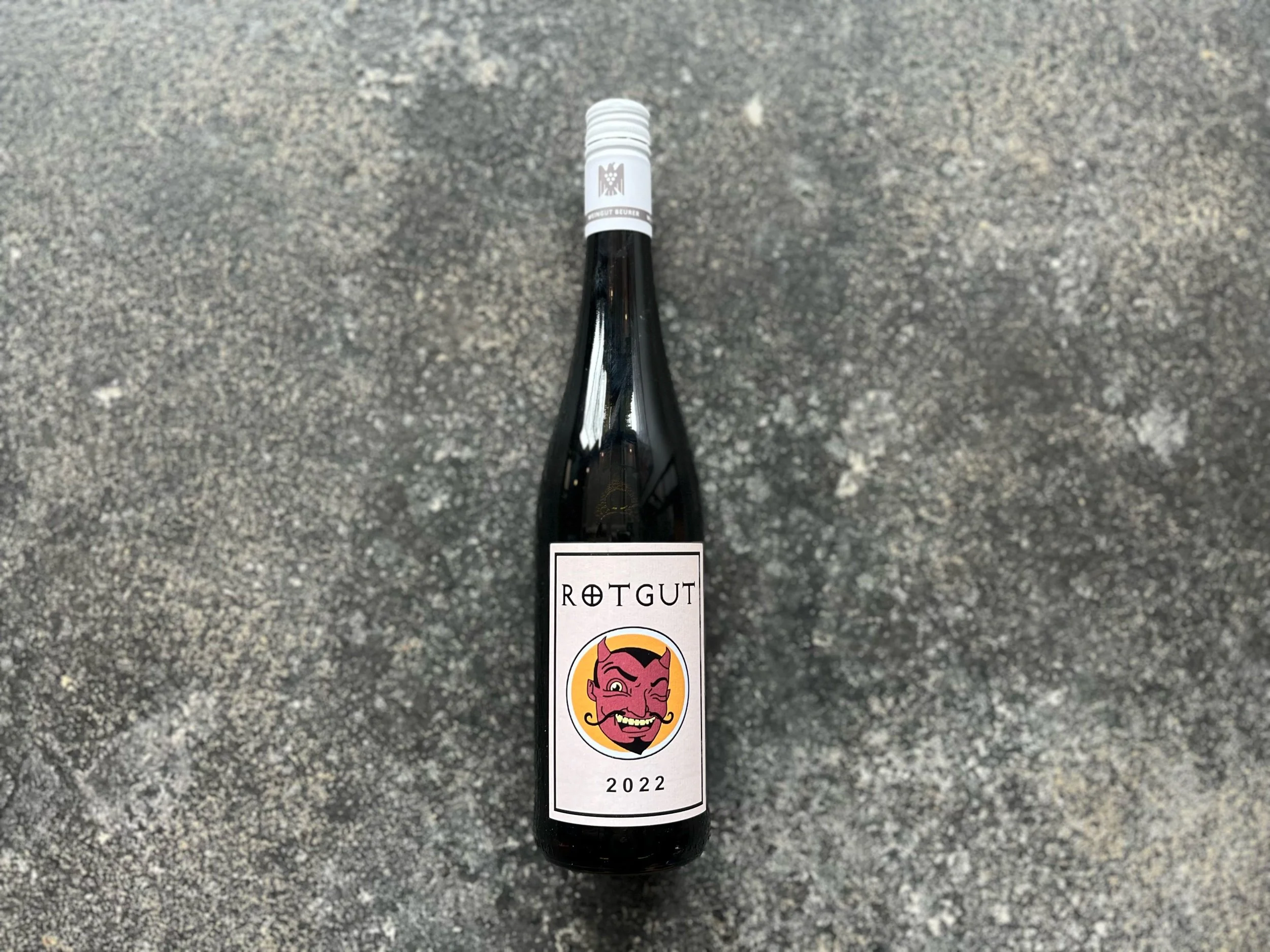Jochen Beurer ‘Rotgut’ Red 2022
Location: Germany, Württemberg
Winemaker: Jochen Beurer
Grapes: Spätburgunder, Dornfelder and Portugeiser
From the Importer Vom Boden: An ex-European BMX Champion gone natural wine guru, in Swabia. Some things don’t have to make sense, ok?
Here’s the hypothesis we’ll set out to prove: Jochen Beurer may be one of the most important winemakers in Germany.
His wines are pure energy; they have a universal vibration to them. They seemingly do not follow the laws of physics that govern the rest of the conventional wine world. They float.
Among winemakers in Germany, Beurer is revered and his whites and reds are nearly always considered among the greats. Few winemakers are able to achieve such thrust and such purity, from the simpler Trollinger and Portugieser up to Grauburgunder, Sauvignon Blanc and, yes, Riesling.
Yet Beurer’s influence flows not only through his wines, but through his actions. Jochen is one of the deepest thinkers about the environment beyond the vineyards. A tour with Beurer is as likely to include a discussion of his bees, the vegetation and animals surrounding the vineyards as it is to include a discussion of the soil and vines themselves.
I have met few winemakers who seem to see the “whole” as clearly and succinctly as Beurer does. Jochen farms both organic and biodynamic (he is Demeter certified), yet still he does not speak in easy truths; he seems to be seeking a viticulture that is beyond these simple rules, more integrated, more complete.
Jochen is also one of the kindest humans out there; a bear of a man who is profoundly nurturing. A whole generation of young German winemakers has passed through Beurer’s cellar. We’re getting to the heart of why Beurer is so important to German winemaking.
Nonetheless, it’s not shocking that Beurer is less well known in the U.S. He’s from Swabia, a southern region only recently created by the importer Selection Massale. Swabia is not part of the old-school, canonical history of winemaking in Germany. It is a fertile place, with a diverse array of agriculture. Which brings us to the other reason that Beurer is not as famous as he should be: he does not focus solely on Riesling, but embraces the wild and complicated diversity of Teutonic grapes and wines.
‘Rotgut’ (formerly Rot Trocken) is a blend of Spätburgunder, Dornfelder and Portugeiser. This is Beurer’s red blend. While not as light and bright as the Trollinger, it’s still a pretty vivid and energetic wine. The fruits are darker toned, there is a gravelly soil note not unlike Bordeaux or, maybe more appropriately, Loire reds. What else you wanna know? It’s ****ing delicious. The name, of course, is a joke – roughly translating to “good red.” This ain’t rot gut.
Location: Germany, Württemberg
Winemaker: Jochen Beurer
Grapes: Spätburgunder, Dornfelder and Portugeiser
From the Importer Vom Boden: An ex-European BMX Champion gone natural wine guru, in Swabia. Some things don’t have to make sense, ok?
Here’s the hypothesis we’ll set out to prove: Jochen Beurer may be one of the most important winemakers in Germany.
His wines are pure energy; they have a universal vibration to them. They seemingly do not follow the laws of physics that govern the rest of the conventional wine world. They float.
Among winemakers in Germany, Beurer is revered and his whites and reds are nearly always considered among the greats. Few winemakers are able to achieve such thrust and such purity, from the simpler Trollinger and Portugieser up to Grauburgunder, Sauvignon Blanc and, yes, Riesling.
Yet Beurer’s influence flows not only through his wines, but through his actions. Jochen is one of the deepest thinkers about the environment beyond the vineyards. A tour with Beurer is as likely to include a discussion of his bees, the vegetation and animals surrounding the vineyards as it is to include a discussion of the soil and vines themselves.
I have met few winemakers who seem to see the “whole” as clearly and succinctly as Beurer does. Jochen farms both organic and biodynamic (he is Demeter certified), yet still he does not speak in easy truths; he seems to be seeking a viticulture that is beyond these simple rules, more integrated, more complete.
Jochen is also one of the kindest humans out there; a bear of a man who is profoundly nurturing. A whole generation of young German winemakers has passed through Beurer’s cellar. We’re getting to the heart of why Beurer is so important to German winemaking.
Nonetheless, it’s not shocking that Beurer is less well known in the U.S. He’s from Swabia, a southern region only recently created by the importer Selection Massale. Swabia is not part of the old-school, canonical history of winemaking in Germany. It is a fertile place, with a diverse array of agriculture. Which brings us to the other reason that Beurer is not as famous as he should be: he does not focus solely on Riesling, but embraces the wild and complicated diversity of Teutonic grapes and wines.
‘Rotgut’ (formerly Rot Trocken) is a blend of Spätburgunder, Dornfelder and Portugeiser. This is Beurer’s red blend. While not as light and bright as the Trollinger, it’s still a pretty vivid and energetic wine. The fruits are darker toned, there is a gravelly soil note not unlike Bordeaux or, maybe more appropriately, Loire reds. What else you wanna know? It’s ****ing delicious. The name, of course, is a joke – roughly translating to “good red.” This ain’t rot gut.
Location: Germany, Württemberg
Winemaker: Jochen Beurer
Grapes: Spätburgunder, Dornfelder and Portugeiser
From the Importer Vom Boden: An ex-European BMX Champion gone natural wine guru, in Swabia. Some things don’t have to make sense, ok?
Here’s the hypothesis we’ll set out to prove: Jochen Beurer may be one of the most important winemakers in Germany.
His wines are pure energy; they have a universal vibration to them. They seemingly do not follow the laws of physics that govern the rest of the conventional wine world. They float.
Among winemakers in Germany, Beurer is revered and his whites and reds are nearly always considered among the greats. Few winemakers are able to achieve such thrust and such purity, from the simpler Trollinger and Portugieser up to Grauburgunder, Sauvignon Blanc and, yes, Riesling.
Yet Beurer’s influence flows not only through his wines, but through his actions. Jochen is one of the deepest thinkers about the environment beyond the vineyards. A tour with Beurer is as likely to include a discussion of his bees, the vegetation and animals surrounding the vineyards as it is to include a discussion of the soil and vines themselves.
I have met few winemakers who seem to see the “whole” as clearly and succinctly as Beurer does. Jochen farms both organic and biodynamic (he is Demeter certified), yet still he does not speak in easy truths; he seems to be seeking a viticulture that is beyond these simple rules, more integrated, more complete.
Jochen is also one of the kindest humans out there; a bear of a man who is profoundly nurturing. A whole generation of young German winemakers has passed through Beurer’s cellar. We’re getting to the heart of why Beurer is so important to German winemaking.
Nonetheless, it’s not shocking that Beurer is less well known in the U.S. He’s from Swabia, a southern region only recently created by the importer Selection Massale. Swabia is not part of the old-school, canonical history of winemaking in Germany. It is a fertile place, with a diverse array of agriculture. Which brings us to the other reason that Beurer is not as famous as he should be: he does not focus solely on Riesling, but embraces the wild and complicated diversity of Teutonic grapes and wines.
‘Rotgut’ (formerly Rot Trocken) is a blend of Spätburgunder, Dornfelder and Portugeiser. This is Beurer’s red blend. While not as light and bright as the Trollinger, it’s still a pretty vivid and energetic wine. The fruits are darker toned, there is a gravelly soil note not unlike Bordeaux or, maybe more appropriately, Loire reds. What else you wanna know? It’s ****ing delicious. The name, of course, is a joke – roughly translating to “good red.” This ain’t rot gut.

